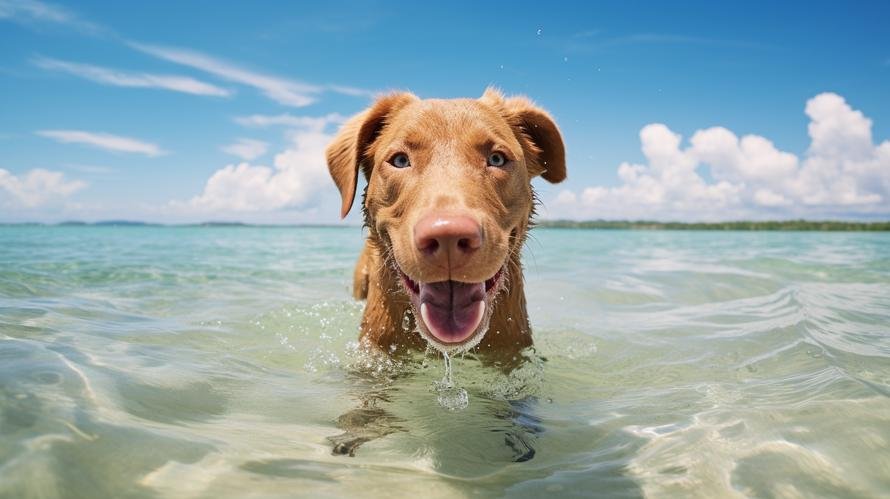Imagine that you’re in a scruffy, charming park around sunset, wherein the red and orange dance together in the sky to create a beautiful canvas. Suddenly, a bright, sharp bark pierces the serenity and an energetic and robust dog, with burnished coat colors ranging from yeasty browns to faded straws, bounds toward you, carrying a Frisbee in its mouth with a playful twinkle in its eye. Welcome to the world of Chesapeake Bay Retrievers, a unique breed largely overlooked compared to the popular Labs or Golden Retrievers.
In their homestead of the United States’ mid-Atlantic region, “Chessies,” as they are often fondly called, have been admired for their strong work ethic, razor-sharp mind, and amiable nature. They were initially bred to retrieve waterfowl in the harsh and cold conditions of the Chesapeake Bay, a characteristic that earned them recognition as one of the most hard-working and resilient canine breeds.
But amidst all their incredible qualities, a question often pops up: are Chesapeake Bay Retrievers friendly dogs? Let’s dive deep into understanding the nuances of this breed to answer the same.
Natively, Chessies are known for their working dog temperament. They are incredibly devoted and protective of their families, showcasing a fiercely loyal nature. When it comes to day-to-day interactions, these intelligent dogs are peaceful companions who adore their humans. They enjoy playing, cuddling, spending time with family members, and they invariably become a cherished part of the family in no time.
Chessies are not naturally extroverted like some other retriever breeds, and they may be initially wary of strangers. But this shouldn’t be misinterpreted as them being hostile. Instead, it’s just an inherent part of their temperament to be cautious. With positive reinforcement, socialization from a young age, and consistent training, Chesapeake Bay Retrievers can become amiable and welcoming towards strangers too, displaying a sociable personality.
Moreover, as retrievers, they have a ‘soft mouth,’ a term used in the world of hunting dogs that signifies that these dogs have an instinctive inclination to carry game or toys gently in their mouths without damaging it. This trait further gears up Chesapeake Bay Retrievers to be great playmates and friends to children. However, like every breed, they should be supervised during initial interactions and taught to mingle appropriately with kids, to ensure a healthy and thriving bond.
Chesapeake Bay Retrievers also cohabit happily with other pets, primarily if introduced from a young age. They can be a bit possessive about their food or toys, but this isn’t a behavior exclusive to them. With proper management and care, they can share living spaces with other pets beautifully.
If you’re considering a Chesapeake Bay Retriever as an addition to your family, it’s equally essential to understand that they are high-energy dogs that require regular exercise and mental stimulation to keep them happy and healthy. Taking them for daily walks, hikes, involving them in canine sports or simply playing fetch in the backyard can help channel their energy positively, making them more relaxed and friendly at home.
In essence, Chesapeake Bay Retrievers are not just friendly, but they are loyal, protective, and intelligent companions who will share your ups and downs tirelessly. With this breed, respect is a two-way street; if you treat them with love, respect, and kindness, they will reciprocate with unmatched devotion and companionship.
Training is key to nurture their friendly behavior further. This includes getting them acclimatized with a variety of people, places, and noises from puppyhood, which can help them grow into a well-rounded, confident, and friendly adult dog. Socialization doesn’t end at puppyhood; they should be regularly exposed to different environments and routines to keep them adaptable and happy.
Make sure to use a lot of positive reinforcements, like treats, praises, or petting during training sessions. Remember, Chesapeake Bay Retrievers respond well to positive, kind, consistent, and patient training methods, and heavy-handed techniques can lead to stubbornness and timidity.
It’s also noteworthy to research a reputable breeder if you’re planning to get a Chessie puppy. A responsible breeder would health test their breeding dogs for common breed-specific issues and would raise their puppies in a clean, comfortable environment. They could guide you through the nuances of the breed, helping you understand them better.
Remember, friendliness in dogs, like humans, is subject to their individual temperament, upbringing, training, and experiences. Chesapeake Bay Retrievers, with their loyal, intelligent, and adaptable nature, can be your best friend and a great family companion with the right approach, understanding, and training.



